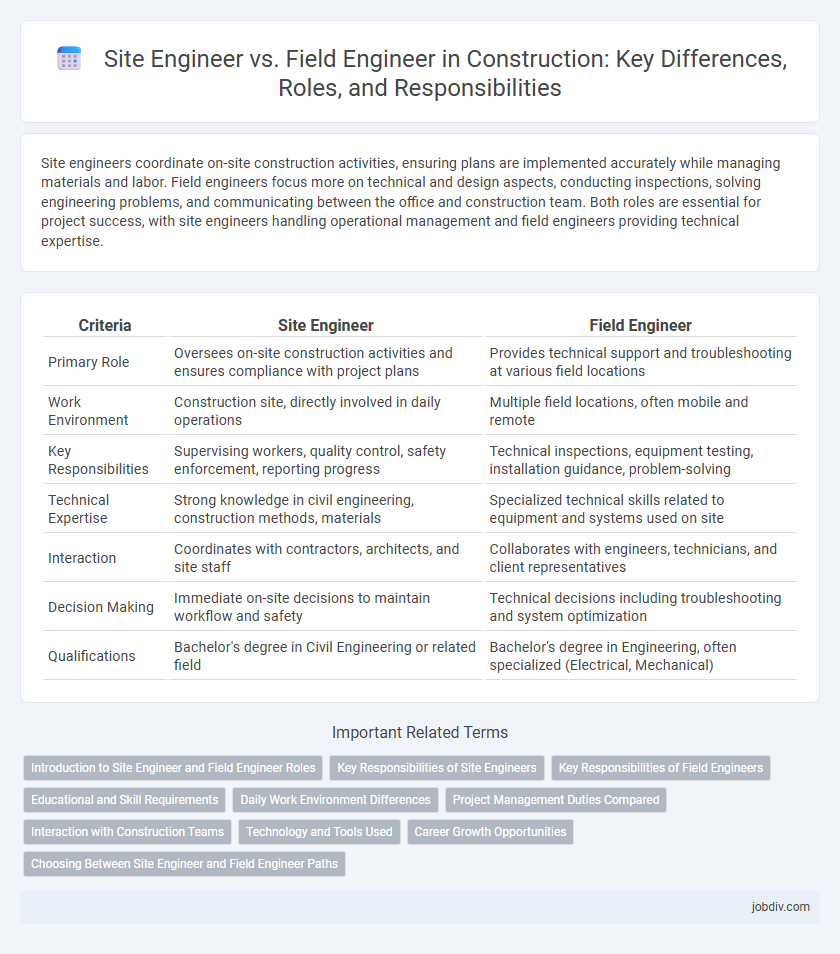Site engineers coordinate on-site construction activities, ensuring plans are implemented accurately while managing materials and labor. Field engineers focus more on technical and design aspects, conducting inspections, solving engineering problems, and communicating between the office and construction team. Both roles are essential for project success, with site engineers handling operational management and field engineers providing technical expertise.
Table of Comparison
| Criteria | Site Engineer | Field Engineer |
|---|---|---|
| Primary Role | Oversees on-site construction activities and ensures compliance with project plans | Provides technical support and troubleshooting at various field locations |
| Work Environment | Construction site, directly involved in daily operations | Multiple field locations, often mobile and remote |
| Key Responsibilities | Supervising workers, quality control, safety enforcement, reporting progress | Technical inspections, equipment testing, installation guidance, problem-solving |
| Technical Expertise | Strong knowledge in civil engineering, construction methods, materials | Specialized technical skills related to equipment and systems used on site |
| Interaction | Coordinates with contractors, architects, and site staff | Collaborates with engineers, technicians, and client representatives |
| Decision Making | Immediate on-site decisions to maintain workflow and safety | Technical decisions including troubleshooting and system optimization |
| Qualifications | Bachelor's degree in Civil Engineering or related field | Bachelor's degree in Engineering, often specialized (Electrical, Mechanical) |
Introduction to Site Engineer and Field Engineer Roles
Site engineers manage on-site construction activities, ensuring project plans are executed according to technical specifications and safety standards. Field engineers provide technical support, solving practical issues on-site and coordinating between design teams and construction crews. Both roles are critical for maintaining project quality, timelines, and communication in complex construction projects.
Key Responsibilities of Site Engineers
Site Engineers primarily oversee on-site construction activities, ensuring project specifications, safety standards, and quality control are rigorously followed. They coordinate with contractors, surveyors, and architects to manage resources, schedule workflows, and resolve technical issues in real time. Their role is critical for executing project plans accurately, maintaining compliance with regulatory requirements, and achieving timely project delivery.
Key Responsibilities of Field Engineers
Field Engineers in construction oversee on-site project execution, ensuring plans and specifications are accurately followed. They coordinate with contractors, conduct site inspections, and manage material deliveries to maintain workflow efficiency. Their role includes troubleshooting technical issues and ensuring compliance with safety regulations throughout the construction process.
Educational and Skill Requirements
Site Engineers typically require a bachelor's degree in civil engineering or construction management combined with strong project management and surveying skills. Field Engineers often hold degrees in engineering disciplines such as mechanical, electrical, or civil engineering, emphasizing technical troubleshooting and on-site equipment operation. Proficiency in software tools like AutoCAD, BIM, and strong communication skills are essential for both roles to ensure effective coordination and execution of construction projects.
Daily Work Environment Differences
Site Engineers primarily coordinate construction activities, ensuring design specifications and safety standards are met on-site, while Field Engineers focus on technical problem-solving and quality control within varying project phases. Site Engineers engage directly with contractors and labor teams, managing schedules and resources in dynamic outdoor environments, whereas Field Engineers analyze structural data and oversee testing processes, often navigating diverse field locations. The daily work environment for Site Engineers is more supervisory and operational, contrasting with the technical and investigative nature of Field Engineers' tasks.
Project Management Duties Compared
Site Engineers focus on coordinating on-site construction activities, ensuring project specifications, safety standards, and quality control are met. Field Engineers handle technical problem-solving, equipment management, and direct communication with subcontractors to keep the project on schedule. Both roles contribute to project management, but Site Engineers emphasize daily operational coordination while Field Engineers concentrate on technical execution and troubleshooting.
Interaction with Construction Teams
Site Engineers primarily coordinate with architects, contractors, and surveyors to ensure accurate execution of project plans, facilitating real-time problem-solving on-site. Field Engineers concentrate on supervising labor teams, machinery operation, and compliance with safety protocols, maintaining direct communication with foremen and equipment operators. Both roles require strong collaboration skills but differ in their focus areas--Site Engineers manage technical specifications and quality control, while Field Engineers oversee daily field operations and workforce productivity.
Technology and Tools Used
Site Engineers primarily use CAD software, GPS surveying tools, and project management platforms to ensure precise design implementation and real-time progress tracking. Field Engineers rely on handheld devices, drones for site inspection, and BIM (Building Information Modeling) software to monitor construction quality and coordinate with onsite teams. Both roles increasingly integrate IoT sensors and mobile apps to enhance communication, data collection, and workflow efficiency on construction projects.
Career Growth Opportunities
Site Engineers typically advance by gaining expertise in project management, quality control, and regulatory compliance, leading to roles such as Project Manager or Construction Manager. Field Engineers often specialize in technical problem-solving and equipment management, which can elevate them to positions like Technical Manager or Engineering Consultant. Both career paths offer substantial growth potential, with Site Engineers leaning towards leadership and coordination, while Field Engineers deepen their technical proficiency.
Choosing Between Site Engineer and Field Engineer Paths
Choosing between Site Engineer and Field Engineer paths depends on the desired involvement in project execution and technical problem-solving on construction sites. Site Engineers primarily manage on-site operations, ensuring compliance with design specifications, safety protocols, and quality standards, while Field Engineers focus more on technical support, equipment calibration, and data collection across various project locations. Evaluating career goals regarding hands-on site management versus engineering analysis helps construction professionals select the ideal role for skill development and industry impact.
Site Engineer vs Field Engineer Infographic

 jobdiv.com
jobdiv.com